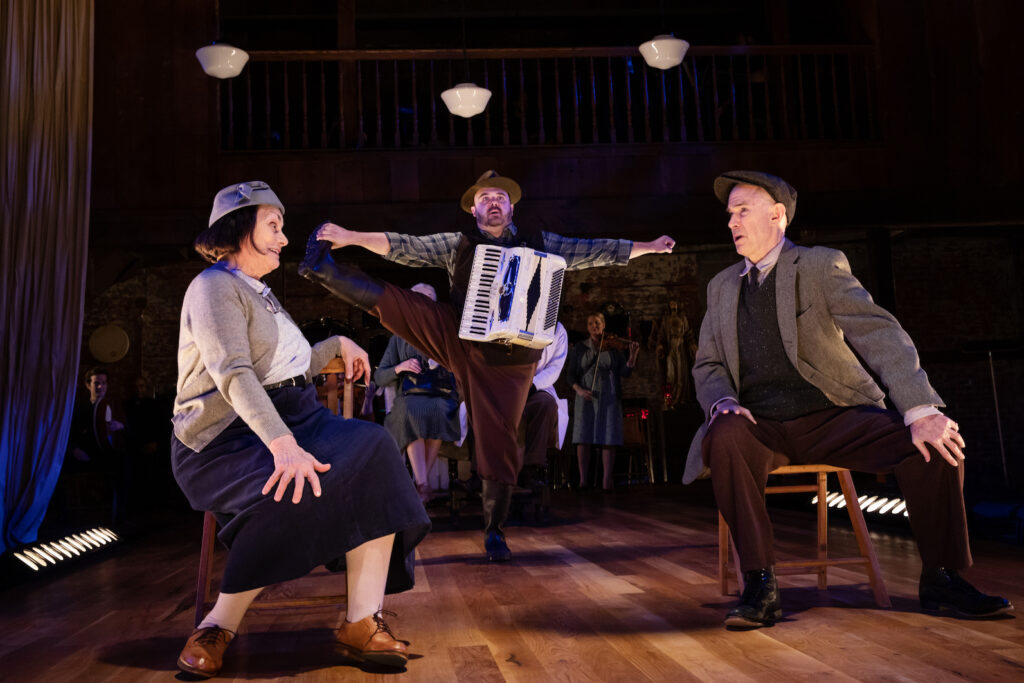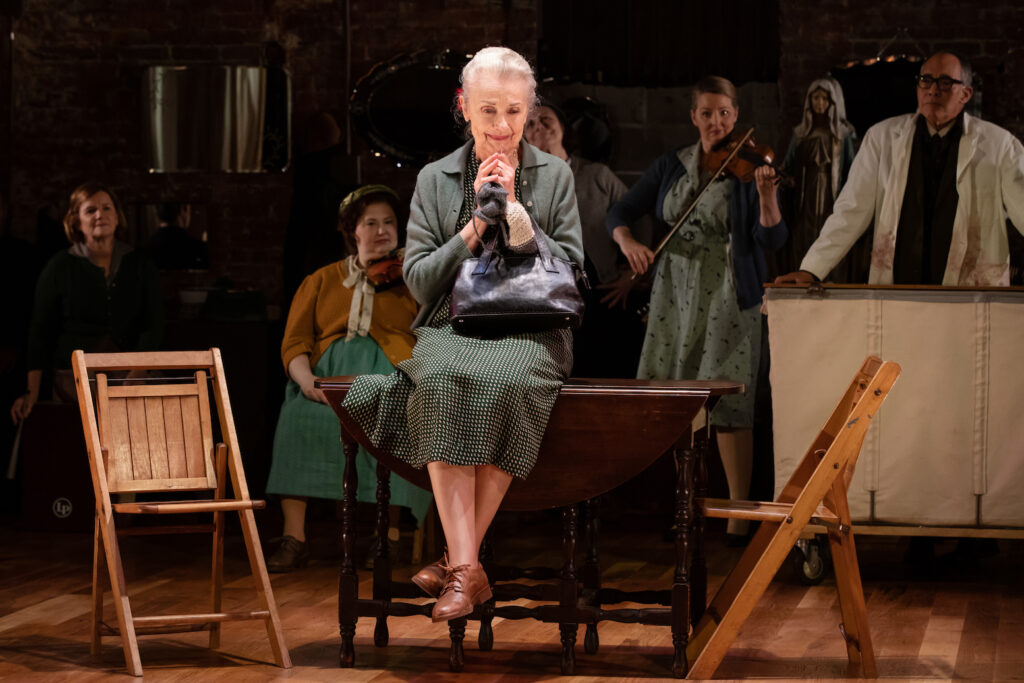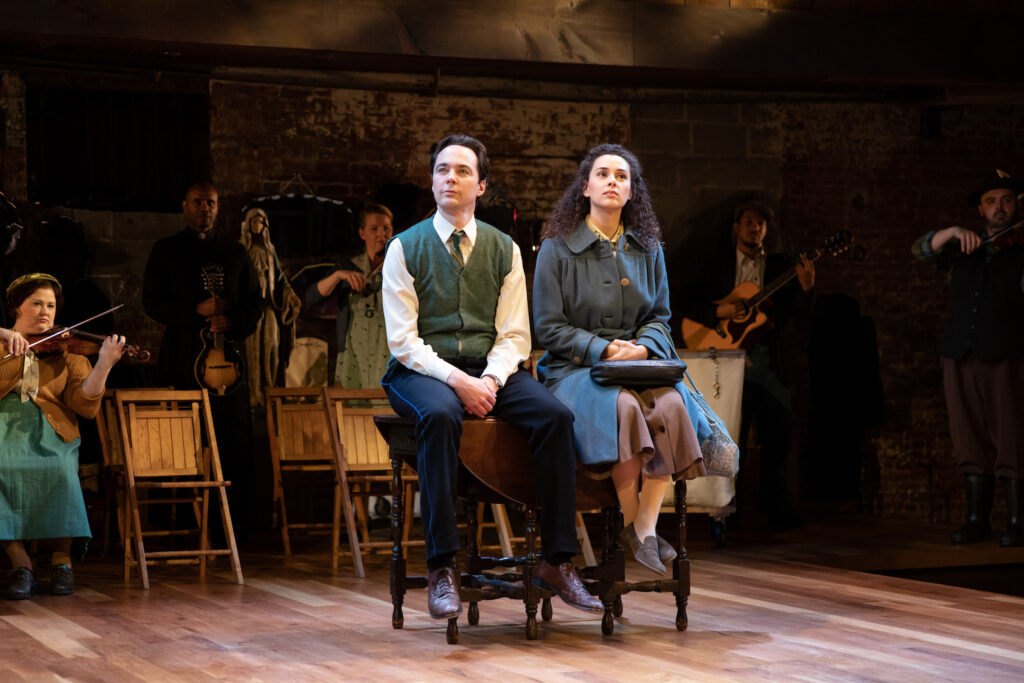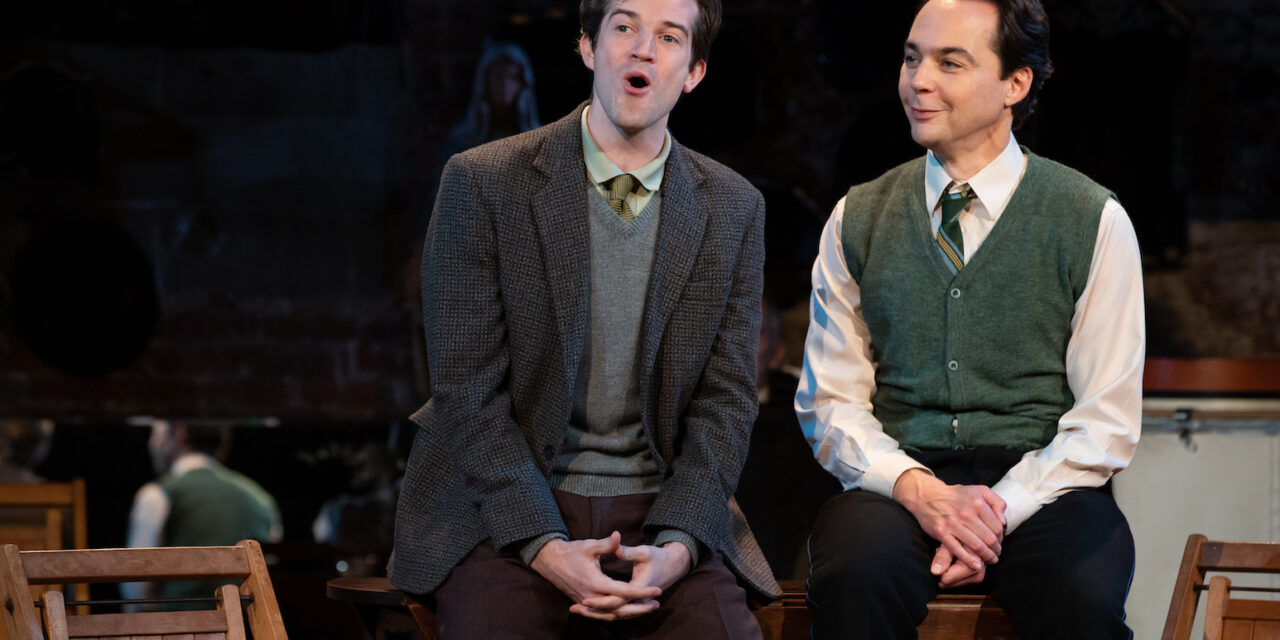By Samuel L. Leiter . . .
Probably no other New York stage director has as recognizable a style as John Doyle (The Color Purple), who has been regularly demonstrating it at the Classic Stage Company for six years as artistic director. If you’ve seen more than two of his shows you know that he strips the fat from the scripts he stages, cutting characters; designing sets that eliminate unnecessary scenery, with a minimal number of basic furnishings on a bare stage; and, when doing musicals, casting at least several actors who can play instruments, which they tote around, in character, throughout. Sometimes his less-is-more aesthetic clicks, sometimes it doesn’t. In the case of his current show, a revival of A Man of No Importance, the 2002 musical with book by Terrence McNally, lyrics by Lynn Ahrens, and music by Stephen Flaherty, it clicks, and smartly.

Originally seen at Lincoln Center’s Mitzi E. Newhouse Theatre, the show is based on the 1994 movie of the same name starring Albert Finney as Alfie Byrne, the alleged man of no importance, a phrase borrowed from the title of Oscar Wilde’s 1893 society play A Woman of No Importance. A paean to the value of theater in lifting us to another plane, the show’s premiere starred the late Roger Rees as Alfie, now taken by Jim Parsons (The Boys in the Band).
Alfie, who spouts poetry and loves to cook, is an art-obsessed bus conductor in 1964 Dublin, his bus being driven by the handsome, Robbie Faye (A.J. Shively, sterling), a hetero guy whom the closeted Alfie, a devotee of Wilde, refers to as Bossie (an allusion to the English lord whose affair with Wilde led to the latter’s imprisonment). Alfie, who lives with his unmarried sister Lily (a thoroughly winning Mare Winningham, Girl from the North Country), finds fulfillment in directing a group of amateur actors at St. Imelda’s Church, where Father Kenny (Nathaniel Stampley, very good) is the priest. Although the St. Imelda Players’ activities have been suspended, Alfie, one of whose last productions was a single performance of Wilde’s The Importance of Being Earnest, very much wants to start the group up again with Wilde’s once controversial Salomé, especially once he spots Adele Rice (Shereen Ahmed, My Fair Lady), a pretty girl on his bus who looks like perfect casting for the lead, she of the dance of the seven veils.


Within the premise framing the action, wherein the ensemble serves as a Greek chorus to tell Alfie’s story, we view his relationship with his caring sister, who, unaware of his orientation, refuses to marry until he does, and has no patience with his theatrical involvement. Her butcher-beau, Mr. Carney (Thom Sesma), fancies himself the troupe’s star; the actors are thrilled to be up again on the stage, allowing numerous bits affectionately satirizing amateur thespians; Alfie persuades the reluctant, insecure, working-class Adele to play the princess Salomé; Robbie refuses to play John the Baptist (a.k.a. Jokanaan)—who literally loses his head—then introduces Alfie to the pub life he himself enjoys; and, among Alfie’s other experiences, he’s forced to confront his suppressed longings, including his feelings for Robbie. (Wilde, manifested in a dream, encourages Alfie to fight temptation by succumbing to it.) Adele’s troubled love life further complicates matters.
The chief crisis occurs when Mr. Carney uses his influence on the sodality to condemn Salomé on the grounds that it’s blasphemous, leading to its being shut down, vastly disappointing Alfie and his players. The discovery by Alfie of Robbie’s affair with a married woman leads to an argument about those one chooses to love, and the men’s friendship is threatened. Flirted with by another man, Alfie gives in to his feelings, only to be beaten as a “poofter”—but it at least forces a coming to terms with Lily. Alfie’s exposure, though, causes his relationships to unravel until the tide turns: Robbie agrees to be in the play, and the actors recreate their troupe under the guidance of Alfie, his importance clearly justified.


The show takes pleasure in expressing theater’s power to create community and its ability to help its practitioners transcend the travails of daily life. The Ahrens-Flaherty score underscores the quotidian nature of Alfie’s world, never dipping into pretentiousness, practically every song sounding as if anyone who can carry a tune could sing it, although the voices here, like the sweet soprano of Ms. Ahmed and the punchy tones of Ms. Winningham, are far from ordinary. As troupe member Baldy, Benjamin Howes’s graveside song to his late wife, “Cuddles That Mary Gave,” couldn’t be more touching. There are no huge blockbuster tunes, most having a mild Irish lilt and catchy rhythmic underpinning. Modest as it is, it’s a highly listenable, sweetheart of a score.
Ann Hould-Ward’s 1960s costumes strike the right note; Adam Honoré’s lighting of Doyle’s minimalist set is exceptionally nuanced; and Bruce Coughlin’s orchestrations capture the score’s indelible charms. The ensemble, using decent enough Irish accents (Mr. Parsons’s is the weakest), is outstanding, most players capturing their character with a few smart strokes (veteran Mary Beth Peil as an elderly actress is especially noteworthy). A small band in a balcony supplements those actors toting accordions, fiddles, and the like. Ms. Ahmed, lovely as she is, however, seems too refined for Adele, whom the script suggests should be rather common, while Mr. Parsons is blandly satisfactory as the troubled Alfie. He’s pleasant enough company, and his intelligence is clear, but his singing is little more than ordinary, and his emotional depths unsounded.


Clocking in at a brisk, intermissionless hour and 45 minutes, A Man of No Importance is an important contribution to the season. I suspect there’s talk of a Broadway move, but given the feel of this production in the intimate CSC space, where it’s done on a long platform surrounded by the audience on three sides, the only appropriate venue would be the Circle in the Square. Whatever its fate, A Man of No Importance, like Alfie Byrne, proves to be a show of some, if limited, importance.
A Man of No Importance. Through December 18 at Classic Stage Company (136 East 13th Street, between Third and Fourth Avenues). One hour 45 minutes, no intermission. www.classicstage.org
Photos: Julieta Cervantes


















